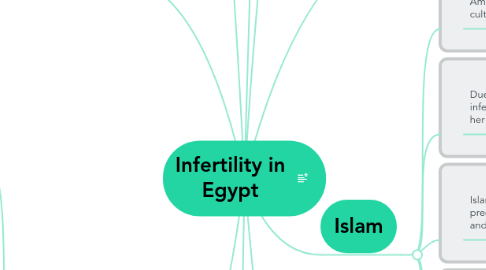Infertility in Egypt
by Natasha Ayers

1. Education
1.1. Amira is very educated, experienced, savvy and she speaks perfect English. She is also extremely articulate
1.2. Understands her predicament with a broad sense of the big picture
1.3. She held a career as a banker for 13 years, before leaving her career to move to the UK with her husband.
1.4. Nicknamed "the Philosopher"
1.5. Independence
1.5.1. Amira is a very independent woman, in both thought and actions. She is very committed to herself.
1.5.2. She boldly does anything she deems necessary to get the result she desires, including visiting doctors without her husband's knowledge or approval, to find a solution.
2. Inheritance
2.1. For the wealthy, having children is seen as a necessity because the family wealth must be passed on properly.
2.2. Adoption thwarts this movement of family money because it is seen as money being given to an outsider.
2.3. Wealth complicates familial love.
3. Children
3.1. Seen as necessities for carrying the family bloodline, maintaining social standing, political positioning, and economical reasons.
3.2. Less about love than making sure money travels ideally through descendants. However, this is not to say children are not loved and desired for other reasons too.
3.3. Children are the reason for living among those in Amira's culture. The reason for marriage, for existing, for working. Everything comes down to the children.
3.4. Without children, in their society, Amira and her husband are not taken seriously.
3.5. Amira feels empty without children. She was an only child, and swore to herself she would have a very large family of her own.
3.6. Amira is not interested in adoption; she feels she would not love the child the same, and they wold be an outsider.
3.7. Children bind families created through arranged marriage; offering love between people who are basically strangers.
3.8. Children are also a weapon for poor women as a protection against divorce.
4. IVF/ Fertility Treatment
4.1. Above all, it is a business based on science and technology.
4.2. For the elite and wealthy only, as it is very costly.
4.3. It's a gamble; there is no guarantee.
4.4. 1992 saw Egypt's first test tube baby born.
4.5. Women can be halted despite their desire to have access to IVF treatment due to lack of funds and non-accepting husbands.
4.6. For those in treatment, it is often not something they broadcast, and consider it "top secret"
5. Abortion
5.1. Though Amira is a Muslim woman, she has a very progressive perspective and can viewed as a feminist.
5.2. She opted to have 4 abortions instead of bearing the children of a man she was not happily married to
5.3. This is evidence of not only her ability to make decisions for herself, but also of her intelligence level to have them done successfully without her parents or husband's awareness- abortion, at the time she had them done, was not legal in her situation without medical reasons. Amira understood how to manipulate the rules to have her way, and secure her freedom.
6. Islam
6.1. Amira is a devout Muslim, culturally and personally.
6.2. Due to her faith, she blames her husband's infertility on her past abortions; a punishment for her sins.
6.3. Islam creates a number of barriers for those in a predicament of infertility, wanting to try IVF, and for those considering adoption.
6.4. Due to her religion, and its influence over her identity as a Middle Eastern woman, Amira would rather receive fertility treatment in Egypt.
6.5. (Sunni) Islam does not allow third-party fertility donations: sperm, eggs, embryos, and uteruses are acceptable.
7. Emad, Amira's Husband
7.1. Emad is a good husband. He is kind, loving, and everything Amira wants in a man, except for the fact that he is blatantly infertile and 50 years old.
7.2. His infertility however, seems to be of no concern to him, or he has a large amount of repressed issues with it.
7.3. He is not keen on fertility treatment, knowing it focuses on his body.
7.4. Emad is a progressive-minded man. He is less concerned with maintaining traditional Islamic ways, and more concerned with work.
7.5. HIs family does not know of his fertility problems; it would be viewed as emasculating.
8. Amira
8.1. Her age, over 35, is a major detracting factor
8.2. Amira is a diverce`
8.3. Her egg counts are low
8.4. Amira will stop at nothing to have a child; she is willing to go to every length, use every technology she can to produce a child
8.5. Her ultimate failure: IVF does not work and Amira has to resign herself to life without child.
8.6. Infertility is a loaded topic in Middle Eastern culture. It fuels shame, stigma, suffering, and repression.
9. Egypt
9.1. One of the first Muslim nations to consciously pursue population control/ reduction in the 1960's.
9.2. Egypt is the 15th largest nation in the world.
9.3. Infertility rate among married couples in Egypt is 12%.


